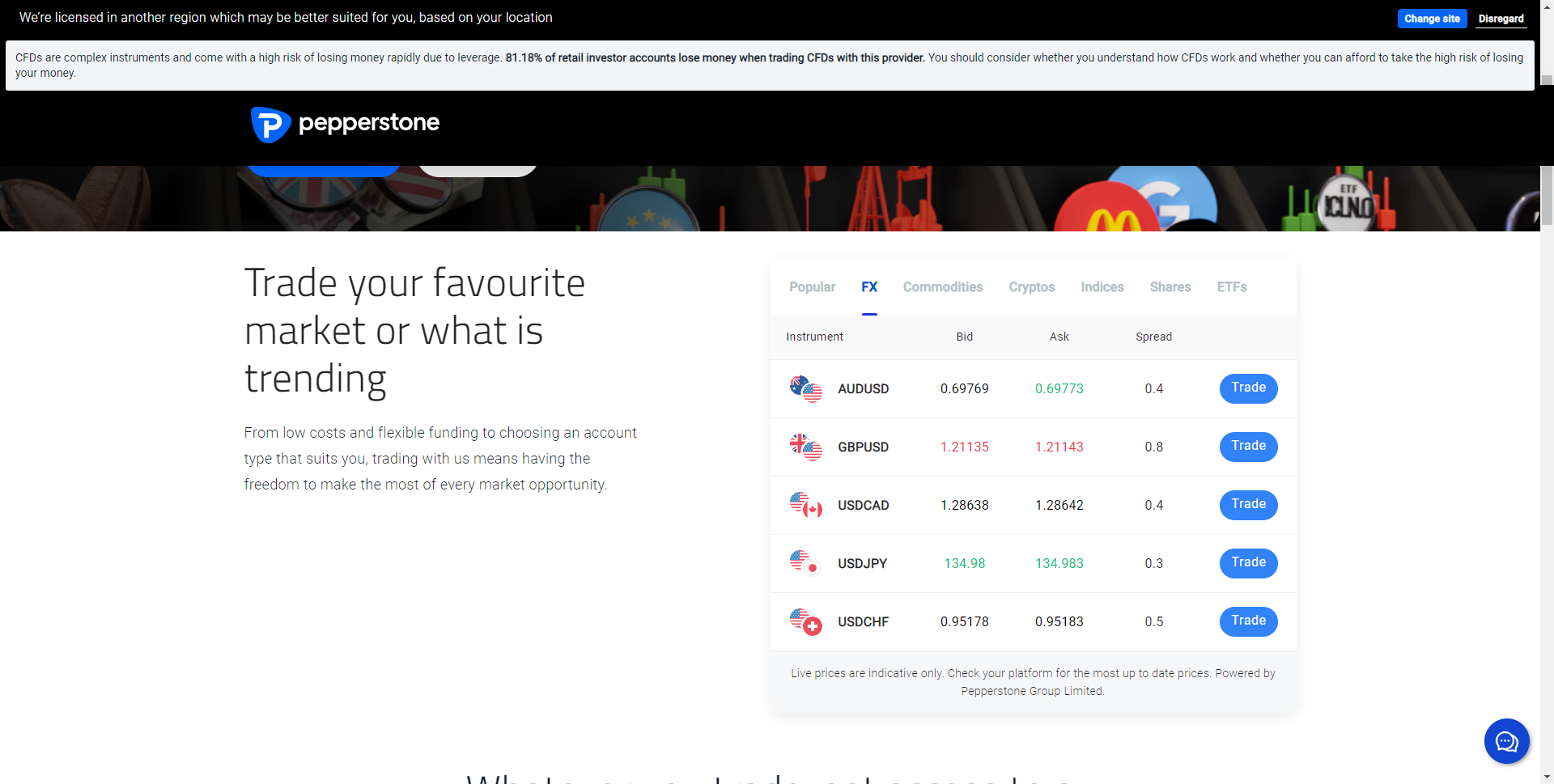Pepperstone – Regulated Trading Platform With Leverage and Low Fees
Please note that we are not authorised to provide any investment advice. The content on this page is for information purposes only.
Please note that we are not authorised to provide any investment advice. The content on this page is for information purposes only.
Choosing a suitable platform to trade online is crucial. Traders will need to consider factors surrounding fees and supported asset classes, alongside the availability of analysis tools and features.
One such platform that aims to sit at the forefront of online trading is Pepperstone. Therefore, the purpose of this Pepperstone review is to assess whether or not the provider should be considered.
Table of Contents
Founded in 2010, Pepperstone is an online trading platform that is headquartered in Australia. Serving clients globally, Pepperstone offers access to more than 1,200 markets across a range of asset classes.
This includes forex, commodities, stocks, indices, and cryptocurrencies. All of the markets supported by Pepperstone are represented by CFDs (contracts-for-differences).

While this does mean that traders will not own the underlying asset, CFDs provide a range of benefits. For instance, all CFD markets at Pepperstone can be traded with leverage, and traders have the option of going long or short on their chosen market.
Pepperstone offers competitive fees across its two core account types, and traders can get started without needing to meet a minimum deposit.
The fee structure of a trading platform should be assessed when choosing a provider. In the case of Pepperstone, the platform does not charge any deposit fees.
Moreover, standard accounts enable traders to enter and exit positions without paying any commissions. The standard account offers an average spread of 0.77 pips when trading EUR/USD.
The other option offered by Pepperstone is its razor accounts. This offers access to institutional grade spreads without markups. This means that EUR/USD can be traded with a minimum spread of 0.0 pips. The razor account at Pepperstone comes with a standard commission fee of $3.50 for every lot traded.
Across both accounts, swap fees will apply for any positions held overnight. Traders will need to refer to the Pepperstone website to assess what swap fees will apply for the asset that they wish to trade.
As noted, all 1,200+ markets at Pepperstone can be traded as CFD instruments. This covers dozens of forex pairs, alongside currency indices. It is also possible to trade hard and soft commodities, such as gold, silver, oil, and natural gas.
Stock CFDs from several marketplaces are supported at Pepperstone, which includes exchanges in the US, Europe, and Australia. Traders can also access more than 100 ETFs from a variety of markets, which covers everything from the iShares India 50 and Energy Select Sector SPDR to the Market Vectors Vietnam.
Due to the flexibility offered by CFDs, all Pepperstone clients have the option of going long or short. This enables traders to profit from both rising and falling markets.
It should, however, be remembered that US clients cannot legally trade CFDs. Hence, Pepperstone is unable to offer accounts to those based in the US.
Pepperstone enables traders to choose from several third-party trading platforms – all of which can be accessed from a range of devices.
This is inclusive of both MetaTrader 4 and 5, as well as cTrader. There is also support for TradingView. These platforms can be accessed via desktop software, an app for iOS and Android, or through standard web browsers.
Pepperstone does not offer its own native platform. Nonetheless, both the MetaTrader and cTrader platforms are known for their commitment to high-level trading tools. This means that Pepperstone clients will have access to dozens of economic indicators, chart drawing tools, and more.
Safety is perhaps the most important metric for traders to consider when selecting a suitable platform. In the case of Pepperstone, the provider is regulated in multiple jurisdictions. This includes the Financial Conduct Authority (FCA) in the UK, alongside the Australian Securities & Investments Commission (ASIC).
Pepperstone is also regulated by the Dubai Financial Services Authority (DFSA), the Securities Commission of The Bahamas (SCB), the Cyprus Securities and Exchange Commission CySEC servicing EEA clients, Federal Financial Supervisory Authority (BaFIN) for Germany and Capital Markets Authority of Kenya (CMA ) for Africa. This means that Peppestone has a great reputation for both safety and investor confidence.
To ensure it complies with global guidelines on anti-money laundering, Pepperstone has a stringent, yet speedy KYC (Know-Your-Customer) program in place. Therefore, anyone opening an account with Pepperstone for the first time will be required to provide some identity documents.
We did, however, find that Pepperstone is typically able to verify KYC documents very quickly.
In summary, Pepperstone will appeal to those seeking a regulated trading platform that specializes in leveraged CFD markets. The platform supports multiple asset classes – including core staples such as stocks, forex, commodities, and indices.CFDs in Cryptocurrencies (for most jurisdictions) and ETFs are supported too.
We found that traders will also appreciate having two account types to choose from – both of which offer competitive fees without requiring clients to meet a minimum deposit amount.
All in all, Pepperstone is a solid trading platform that should tick most boxes for traders of all skill sets.
Cryptoassets are highly volatile unregulated investment products. Always consider the risk of loss before proceeding.